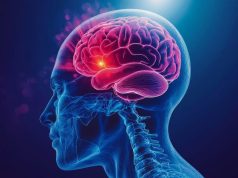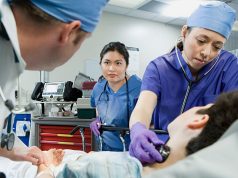By Beth Gilbert HealthDay Reporter
The annual International Stroke Conference of the American Heart Association/American Stroke Association was held from Feb. 7 to 9 in Phoenix and drew participants from around the world, including cerebrovascular research and practice experts. The conference featured presentations that emphasized basic, clinical, and translational medicine and provided insight into the prevention, management, and treatment of stroke.
In one study of patients who present with stroke-like symptoms in an acute care setting, Melinda Chang, of the Columbia University Irving Medical Center in New York City, and colleagues found that patients with a final diagnosis of stroke mimic have a three times greater risk for posttraumatic stress disorder (PTSD) at one-month follow-up compared with those with stroke.
The authors evaluated 1,000 patients, who were an average of 62 years of age (51 percent female and 52 percent Hispanic). The PTSD screening tool, the PCL-5, was used to assess preexisting PTSD during the month prior to presentation and again at one-month follow-up, with questions relating to the stroke-like event. The index events were categorized as stroke, transient ischemic attack (TIA), stroke mimic, or equivocal by a stroke neurologist blinded to PTSD status. The researchers found that approximately 15 percent of patients with stroke mimics had PSTD at one month compared with 6.3 percent of patients with stroke and 5.5 percent of patients with TIA. This was after the investigators controlled for age, gender, ethnicity, initial stroke severity, disability status at discharge, and preexisting PTSD. The only covariate that was significantly associated with PTSD at one month was having preexisting PTSD.
“Even when we removed patients with preexisting PSTD from our analysis, the finding still held: Those who did not have a stroke were more at risk for having PTSD one month later,” Chang said. “It may be counterintuitive, but clinicians should be aware that those patients with stroke mimics may actually suffer more psychological distress after their stroke-like event compared to patients with stroke.”
One author disclosed a financial relationship with Midmark; another author disclosed a relationship with Mighty Health.
In a population-wide study of 180,000 patients with stroke, Raed Joundi, M.D., of McMaster University in Hamilton, Ontario, Canada, and colleagues found that almost one-fifth developed dementia during an average follow-up of 5.5 years. The risk was much higher after stroke than for people in the general population or those who had had a heart attack, after matching for common vascular risk factors, age, and sex.
“Our results confirm the uniquely high risk of dementia after stroke. The study raises the importance of dementia as a common complication after stroke and that we need to find ways to lower the risk of dementia in this population,” Joundi said. “The risk of dementia remained elevated even in long-term survivors of stroke (10+ years), suggesting that stroke somehow exerts a long-term effect on dementia risk. Over the entire follow-up, dementia diagnosis was also more common than having another stroke. This was surprising and means we need to pay attention to dementia as a complication of stroke in the short and long term.”
Several authors disclosed ties to the pharmaceutical industry.
Kent Simmonds, D.O., Ph.D., of the University of Texas Southwestern Medical Center in Dallas, and colleagues found that antidepressant medications are generally safe for most ischemic stroke patients during the crucial early recovery period.
The authors evaluated the frequency of serious bleeding among stroke survivors who took different types of selective serotonin reuptake inhibitor (SSRI) and/or serotonin and norepinephrine reuptake inhibitor (SNRI) antidepressants. They also looked at serious bleeding among stroke survivors who took antidepressants combined with different blood thinners. For most stroke patients with ischemic stroke, the researchers found that antidepressant medications (SSRI and/or SNRI) are safe to use during the crucial early recovery periods. One exception was that an increased bleeding risk was seen among patients started on dual antiplatelet therapy (DAPT) for secondary prevention.
“Clinicians who care for stroke patients in the first few months after a stroke should screen for depression, as recovery after stroke is a time-dependent, nonlinear process which can be negatively affected by depression,” Simmonds said. “Our study showed that treatment of depression with SSRIs or SNRIs during this early recovery period appears safe for most patients, including patients on oral anticoagulation medications. However, personalized risk-benefits should be considered among patients on DAPT, as we did see an increased bleed risk among these patients.”
ASA: Endovascular Thrombectomy Beneficial for Large Ischemic Stroke
FRIDAY, Feb. 16, 2024 (HealthDay News) — For patients with acute ischemic stroke and large cores, endovascular thrombectomy improves clinical outcomes compared with medical management, according to a study published online Feb. 7 in the Journal of the American Medical Association to coincide with the annual American Stroke Association International Stroke Conference, held from Feb. 7 to 9 in Phoenix.
Read Full Text
ASA: No Drop in Recurrent Stroke Seen With Apixaban After Cryptogenic Stroke
FRIDAY, Feb. 16, 2024 (HealthDay News) — For patients with recent cryptogenic stroke and evidence of atrial cardiopathy, the risk for recurrent stroke is not reduced with apixaban versus aspirin, according to a study published online Feb. 7 in the Journal of the American Medical Association to coincide with the annual American Stroke Association International Stroke Conference, held from Feb. 7 to 9 in Phoenix.
Read Full Text
ASA: Door-to-Treatment Time Tied to Survival in Anticoagulation-Linked ICH
THURSDAY, Feb. 15, 2024 (HealthDay News) — For patients with anticoagulation-associated intracerebral hemorrhage, earlier door-to-treatment time is associated with improved survival, according to a study published online Feb. 9 in JAMA Neurology to coincide with the annual American Stroke Association International Stroke Conference, held from Feb. 7 to 9 in Phoenix.
Read Full Text
ASA: Flat Head Position Before Thrombectomy Tied to Better Neurological Function
THURSDAY, Feb. 15, 2024 (HealthDay News) — A flat position for a stroke patient’s head before surgery may improve neurological function, according to a study presented at the annual American Stroke Association International Stroke Conference, held from Feb. 7 to 9 in Phoenix.
Read Full Text
ASA: Embolization of MMA Cuts Risk for Subsequent Subdural Hematoma, Surgery
WEDNESDAY, Feb. 14, 2024 (HealthDay News) — For patients with symptomatic subacute or chronic subdural hematoma, embolization of the middle meningeal artery as an adjunct to surgery reduces the risk for subsequent subdural hematoma and need for surgical drainage, according to a study presented at the annual American Stroke Association International Stroke Conference, held from Feb. 7 to 9 in Phoenix.
Read Full Text
ASA: Adjuvant Methylprednisolone Role Examined in Acute Ischemic Stroke
WEDNESDAY, Feb. 14, 2024 (HealthDay News) — For patients with acute ischemic stroke secondary to large-vessel occlusion undergoing endovascular thrombectomy, adjuvant low-dose methylprednisolone does not improve the degree of overall disability, according to a study published online Feb. 8 in the Journal of the American Medical Association to coincide with the annual American Stroke Association International Stroke Conference, held from Feb. 7 to 9 in Phoenix.
Read Full Text
ASA: Stroke Survivors Face Twofold Higher Risk for MI One Year After Stroke
THURSDAY, Feb. 8, 2024 (HealthDay News) — Stroke survivors are nearly twofold more likely to have subsequent myocardial infarction compared with patients experiencing cervical artery dissection, according to a study presented at the annual American Stroke Association International Stroke Conference 2024, held from Feb. 7 to 9 in Phoenix.
Read Full Text
ASA: Nearly One in Five People Develop Dementia After Stroke
THURSDAY, Feb. 8, 2024 (HealthDay News) — Almost one-fifth of people develop dementia after stroke, according to a study presented at the American Stroke Association International Stroke Conference 2024, held from Feb. 7 to 9 in Phoenix.
Read Full Text
ASA: Vagus Nerve Stimulation + Rehab Boosts Arm, Hand Function in Stroke Survivors
WEDNESDAY, Feb. 7, 2024 (HealthDay News) — Improvements in arm and hand function with vagus nerve stimulation in combination with rehabilitation are maintained at one-year follow-up in stroke survivors, according to a study presented at the annual American Stroke Association International Stroke Conference, held from Feb. 7 to 9 in Phoenix.
Read Full Text
Copyright © 2024 HealthDay. All rights reserved.








